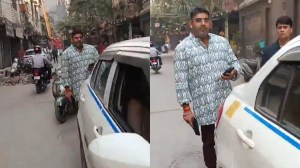Kerala High Court asks state to decide on UAPA convict’s plea to publish his book
The High Court also noted that the Kerala Prisons and Correctional Services (Management) Act did not contain any provision empowering the prison authorities or the government to interdict a prisoner from publishing his literary work.
 The court agreed with the submission of the convict’s counsel that the fundamental rights of prisoners are not completely taken away upon conviction. (File Photo)
The court agreed with the submission of the convict’s counsel that the fundamental rights of prisoners are not completely taken away upon conviction. (File Photo)The Kerala High Court has recently directed the state to decide on the application of a person convicted under the Unlawful Activities (Prevention) Act (UAPA) for permission to publish his book within three months.
Justice V G Arun noted in the order dated November 3 that the convict’s request to publish his book, Bandhitharude Ormakurippukal (Memoirs of the Incarcerated), cannot be denied in the absence of deleterious or harmful content.
The UAPA convict, currently lodged in Viyyur Central Jail, had approached the High Court following an inordinate delay by the state Prisons and Correctional Services authorities in deciding on his request to publish his book.
Earlier, the Superintendent of the Prison had forwarded the convict’s application and the manuscript of the books, along with his recommendation, to the Director General of Prisons and Correctional Services.
The counsel for the convict pointed out that the Kerala Prisons and Correctional Services (Management) Act, 2010 (the Act), does not contain any provision prohibiting the publication of literary works of prisoners.
It was further contended that the right to live with human dignity and enjoy fundamental rights encompasses the right to freedom of thought and expression, and the curtailment of the right militates against the reformative and rehabilitative purposes of the Act.
The government pleader argued that the government is not standing in the way of publishing his book. However, before granting permission, the contents of the book need to be checked to see whether it violates any provisions of the UAPA or contains defamatory, derogatory, or sensitive material requiring redaction, the pleader said.
The court agreed with the submission of the convict’s counsel that the fundamental rights of prisoners are not completely taken away upon conviction.
“By reason of the conviction, a person is not reduced to a non-person, and his rights are made subject to the whims of the prison administration. Their enjoyment of fundamental rights under Part III of the Constitution of India is curtailed only to the extent it is rendered incapable of enjoyment as an incident of the conviction and confinement”, the court said.
The court also noted that the Kerala Prisons and Correctional Services (Management) Act or the corresponding Rules also did not contain any provision empowering the prison authorities or the government to interdict a prisoner from publishing his literary work.
The court therefore held that “the petitioner’s request to publish his book cannot be denied in the absence of deleterious or harmful content”. It directed the state to make a decision on the convict’s application to publish his book within three months.




- 01
- 02
- 03
- 04
- 05



























